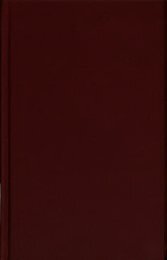Country Profile: Cuba - American Memory - Library of Congress
Country Profile: Cuba - American Memory - Library of Congress
Country Profile: Cuba - American Memory - Library of Congress
Create successful ePaper yourself
Turn your PDF publications into a flip-book with our unique Google optimized e-Paper software.
<strong>Library</strong> <strong>of</strong> <strong>Congress</strong> – Federal Research Division <strong>Country</strong> <strong>Pr<strong>of</strong>ile</strong>: <strong>Cuba</strong>, September 2006<br />
prompted some U.S. concern over the threat <strong>of</strong> a new flood <strong>of</strong> illegal immigration to Florida in<br />
the wake <strong>of</strong> Castro’s death, but no changes in U.S. immigration policy had resulted by mid-<br />
September.<br />
Terrorism: According to the U.S. Department <strong>of</strong> State’s annual terrorism report for 2005, <strong>Cuba</strong><br />
continues “to embrace terrorism as an instrument <strong>of</strong> policy.” <strong>Cuba</strong> has been on the department’s<br />
list <strong>of</strong> states that sponsor terrorism since 1982, citing Fidel Castro’s training and arming <strong>of</strong><br />
communist rebels in Africa and Latin America. Since 1992, however, the regime appears to have<br />
ceased active military support <strong>of</strong> revolutionary groups in the absence <strong>of</strong> subsidies and other<br />
support from the former Soviet Union. Nevertheless, <strong>Cuba</strong> was the only nation that failed to<br />
condemn terrorism at the United Nations General Assembly session on November 16, 2001, and<br />
<strong>Cuba</strong> has continued to actively oppose the U.S.-led “war on terrorism” by taking a stance that<br />
“acts by legitimate national liberation movements cannot be defined as terrorism.” <strong>Cuba</strong> has<br />
provided “limited support” to designated foreign terrorist organizations as well as haven for<br />
some terrorists such as members <strong>of</strong> the Basque terrorist group Fatherland and Freedom.<br />
In past decades, <strong>Cuba</strong> was the target <strong>of</strong> anti-Castro terrorism by Florida-based <strong>Cuba</strong>n exile<br />
groups. For example, <strong>Cuba</strong>n exiles were linked to the firebombing <strong>of</strong> a <strong>Cuba</strong>na airlines DC–8<br />
jetliner that crashed <strong>of</strong>f the coast <strong>of</strong> Barbados, killing all 73 persons aboard on October 6, 1976.<br />
Throughout the 1990s, <strong>Cuba</strong>n-<strong>American</strong> exiles boasted <strong>of</strong> paramilitary raids into <strong>Cuba</strong>, including<br />
a series <strong>of</strong> hotel bombings in Havana in 1997. In 1999 two Salvadoran nationals were convicted<br />
<strong>of</strong> terrorism and sentenced to death for a string <strong>of</strong> hotel bombings carried out in 1997, in which<br />
one foreign tourist was killed. According to prosecutors, both the Salvadorans were acting on<br />
behalf <strong>of</strong> anti-Castro exiles trying to sabotage <strong>Cuba</strong>’s tourism industry.<br />
Human Rights: As a communist dictatorship, the Castro regime has a long record <strong>of</strong> disrespect<br />
for human rights, such as its draconian crackdown on dissidents in March–April 2003. The harsh<br />
prison sentences ranging from six to 28 years that were meted out to 75 human rights activists,<br />
independent journalists, and opposition figures set back the regime’s efforts to win international<br />
and U.S. support for an end to economic and political sanctions. By the end <strong>of</strong> 2005, at least 333<br />
<strong>Cuba</strong>n political prisoners and detainees continued to be held in <strong>Cuba</strong>, according to the U.S.<br />
Department <strong>of</strong> State, but there were no known politically motivated killings or “disappearances.”<br />
To legally repress dissent and restrict freedom <strong>of</strong> speech under the guise <strong>of</strong> protecting state<br />
security, the Castro regime relies on its Criminal Code, which criminalizes enemy propaganda,<br />
the spreading <strong>of</strong> “unauthorized news,” and insults to patriotic symbols. Conditions in <strong>Cuba</strong>’s<br />
overcrowded prisons continued to be harsh and life-threatening in 2005. Prison authorities<br />
frequently beat, neglected, isolated, and denied medical treatment to detainees and prisoners,<br />
particularly those convicted <strong>of</strong> political crimes or those who persisted in expressing their<br />
oppositional views. Authorities also <strong>of</strong>ten denied family visitation, adequate nutrition, exposure<br />
to natural light, pay for work, and the right to petition the prison director.<br />
33



![Albert Einstein Papers [finding aid]. Library of Congress. [PDF ...](https://img.yumpu.com/21604228/1/190x245/albert-einstein-papers-finding-aid-library-of-congress-pdf-.jpg?quality=85)





![American Colony in Jerusalem Collection [finding aid]. Library of ...](https://img.yumpu.com/17941275/1/190x245/american-colony-in-jerusalem-collection-finding-aid-library-of-.jpg?quality=85)



![Piccard Family Papers [finding aid]. - American Memory - Library of ...](https://img.yumpu.com/17941234/1/190x245/piccard-family-papers-finding-aid-american-memory-library-of-.jpg?quality=85)


